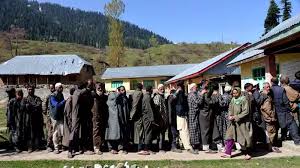Shafqat Sheikh
As Jammu and Kashmir prepares for its first Legislative Assembly elections in a decade, a sense of déjà vu grips the region. The elections, which are to be held in three phases, come after a long period marked by significant political and constitutional changes, including the bifurcation of the erstwhile state into two Union Territories on August 5, 2019. The Model Code of Conduct will remain in force until the results are declared, ensuring that the election process remains free from undue influence and malpractice.
Reflecting on the years since the last elections in 2014, one cannot ignore the re-emergence of public contractors—figures who have long played a shadowy role in the politics of the region. These contractors, often aligned with powerful political leaders, have repeatedly exploited the poor and vulnerable, manipulating them for personal gain. From Kishtwar to Doda, the story has been the same: promises made, lives sold, and fortunes amassed at the expense of the common people.
The contractors, who switch allegiance between parties with ease, have become a symbol of the political malaise in the region. They move from one party to another, finally contesting as Independents when their party refuses them a mandate. Their goal is always the same—to secure power and wealth, often by any means necessary. These contractors have mastered the art of selling false hopes to the electorate, promising the moon during election campaigns, only to disappear once they have secured their position.
The Election Commission of India, recognizing the growing disillusionment among voters, has introduced a new option on the Electronic Voting Machine (EVM)—the “None of the Above” (NOTA) button. This symbol allows voters to reject all candidates, offering them a chance to express their dissatisfaction with the current political choices. By casting their vote for NOTA, citizens can participate in what the Election Commission has called “Greater Participation toward Larger Democracy,” a move aimed at empowering the electorate and boosting voter morale.
The introduction of NOTA is particularly significant in a region like Jammu and Kashmir, where political leaders have often failed to deliver on their promises. The option gives voters a chance to send a strong message to those who seek to exploit their trust. If there is no secular or worthy candidate, the voter can now choose NOTA, exercising their right to dissent and demanding better representation.
As the elections approach, it is crucial for the people of Jammu and Kashmir to make an informed decision. They must carefully evaluate the candidates and parties, understanding the ideologies and motivations behind their campaigns. The era of blindly following political leaders must come to an end. Instead, voters should seize this opportunity to elect leaders who genuinely represent their interests, or, if none exist, to reject the status quo by choosing NOTA.
The power to shape the future of Jammu and Kashmir lies in the hands of its people. They must decide whether to continue supporting the contractors of old, who have repeatedly failed them, or to seek new, more accountable leadership. This election is not just about choosing representatives—it is about reclaiming the dignity and rights of the people, and ensuring that their voices are heard in the corridors of power.
—
Shafqat Sheikh is a freelance writer and socio-political activist from Bunjwah, Inderwal. He can be reached at 09419974577 or freelancershafqat@gmail.com.




